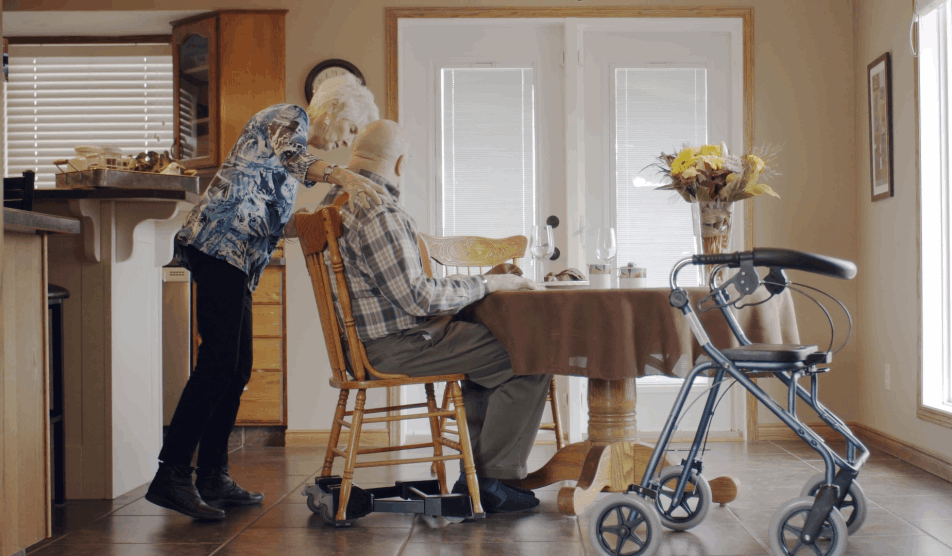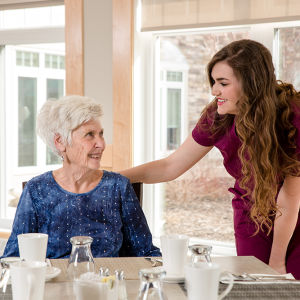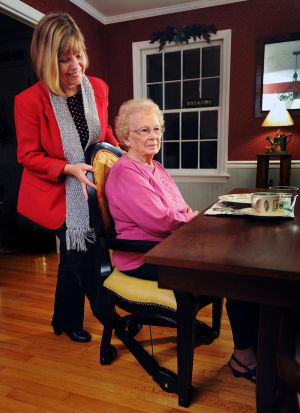
1. Aha Moments...
2. Age In Place Interior Design - The Kitchen
3. Meet Randy...

1. Aha Moments...
2. Age In Place Interior Design - The Kitchen
3. Meet Randy...
Comments which garner the greatest feedback as I (Randy S.) make presentations to seniors relates to a baby boomer’s understanding of aging issues, the physical and emotional needs of a parent, and their responsibilities as they assume the role of being a care provider! I call these AHHA moments.
Parents will say and do most anything not to be a burden nor an inconvenience to their kids. They also do not want to be a spectacle. Placing them into a chair and then fussing over them while moving them up-to the table is embarrassing. Joy comes from blending in....just being one of the group.
Today’s seniors grew up in the 1920/30/40. They were taught to be self-reliant. Waiting for someone to assist them is not in their nature. Are they stubborn….or....just self-determined?
Retail Therapy: In all the years of retail shopping experience, it is rare for a baby boomer to have checked out products in a durable medical equipment store. “This device does what?” It is not uncommon for baby boomers to be in denial they will ever need to endure a sedentary lifestyle...much less lose control of bodily functions or mobility. The first time they are asked to purchase incontinence pads for an aging parent….their own mortality is realized.
A wheel chair to a senior is merely “one appliance before the gurney!” Anytime a senior can use a more conventional looking dining chair provides them with an increased sense of dignity and self-worth to the aging parent.
New Title: Caregiver. Being a caregiver to a family member is not a job or a title that is applied for. The title, duties and responsibilities are bestowed simply as a result of a loved one not being able to live independently. Often times the stress and anxiety experienced by a caregiving spouse or child is overlooked by other members of the family as it is our nature to be concerned for the person for whom they are caring for. The reality is it is the caregiving family member whose life has been turned upside down. They are the ones burning the candle at both ends.
Take a moment, ask the caregiving spouse or child, “HOW ARE YOU DOING?” I think you will be surprised by the response!

It has been said the “kitchen is the heart of the home”. It is where we are nourished. It is used by all!
Often overlooked in the re-design of the kitchen, to support a senior’s desire to live independently, is the selection of dining / kitchen tables and chairs. As we age we lose some of our agility, strength and mobility, we no longer have the ability to “scoot” ourselves up- to or away-from the table. At these times seniors look to others (spouse, family member or caregiver) for assistance.
"How does a spouse/family member move a seated person up-to the table….without risk of personal injury?” This is not as easy to accomplish as one would like, due in no small way to the physical effort and coordination required. Spouses no longer have the ability to simply push or shove their loved one up-to the table, as they too, are an aging senior!
While the use of a wheelchair eases the effort required on behalf of the spouse or family member, families need to appreciate to a senior, a wheelchair is simply “one appliance before the gurney”. Designs enabling seniors to use “normal looking” furniture provides an increased sense of dignity and self worth. Families are encouraged to select tables with height adjustable tops and chairs that safely swivel…and…turn!
Watch video

May 2020
The dynamics associated with the loss of one's mobility, aging and caregiving are complex and involved. With upwards of 10,000 people a day achieving the age of 65, the reality of a loved one losing his / her independence will impact each member of the family, either as (a) one who will lose physical ability and require care, or as (b) one whose new role will include that of being the caregiver.
The loss of independence is stressful for all members of the family / caring community.
Persons whose physical abilities is not what it once was experience an overwhelming sense of being a burden or a nuisance to their caregiving staff and/or family. Often times these once proud individuals will be seen sitting or eating in awkward places, for no reason other than they did not want to inconvenience anyone any more than absolutely necessary. “That’s good enough!” “Please you do not have to fuss over me” are comments frequently uttered. Asking for assistance and then being shuffled around in a chair draws attention to themselves in a manner they would rather avoid. So, in silence these cherished members of our family feel isolated, alone and dare I say even “ashamed” of their current lot in life!
Persons giving care feel helpless as often there is nothing that can be done to improve the situation for an aging loved one! Caregivers frequently lack physical strength to adjust / move a seated person to a place of greater comfort or enjoyment! Without some mechanical means, even the most cherished of bonding times like a meal, afternoon coffee or working together on a Christmas puzzle cannot be enjoyed as there is no easy way to get everyone up to the table.
ComforTek has designed several different chairs, tables and attachments which address issues of mealtime mobility thereby significantly reducing levels of stress and anxiety experienced by caregivers.
ComforTek appreciates each families’ situation is unique and that a single product will not be the solution to every situation. However, we are equally convinced the greatest appreciation for these products will be evident in the lives of cherished loved ones as they experience an increased sense of independence, dignity and self-worth!
 Randy Schellenberg
Randy Schellenberg